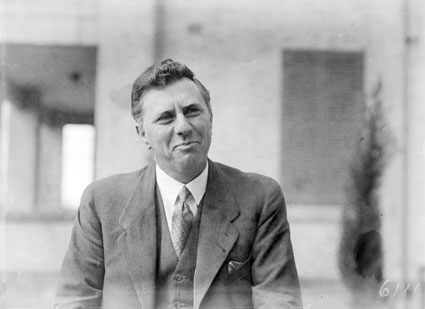FRANCIS (FRANK) BRENNAN 1873–19501
Born at Upper Emu Creek (Sedgwick), near Bendigo, Victoria in 1873 Francis (Frank) Brennan was the eleventh of the 13 children of Irish-born parents Michael Brennan and Mary, née Maher. His father, then a farmer, was a former miner and carrier and in 1882 became the Strathfieldsaye Shire secretary and engineer.
Primarily educated by a tutor at home, Frank Brennan later studied at the University of Melbourne, with financial assistance from his older siblings. Graduating with a Bachelor of Laws in 1901, he went into private legal practice, specialising in union business, a growth area after the foundation of the Commonwealth Court of Conciliation and Arbitration in Melbourne in 1905. Other members of his family also chose law as a profession. His elder brother Michael worked in the state Crown Law Department; and Thomas, at one time a journalist, became an eminent barrister specialising in criminal law and served as an Australian senator in the 1930s. Encouraged and supported in her studies by her brothers, the youngest member of the Brennan family, Anna, became the first woman to graduate in law from the University of Melbourne in 1909. She did her articles in Frank Brennan's firm and worked there for the rest of her career. A specialist in matrimonial law, she was the senior partner running Brennan and Co while her brother focused on politics.
President of the Catholic Young Men's Society in 1906, Brennan became well-known as a church layman, particularly through his gifted oratory. He joined the Australian Labor Party2 in 1907. Twice unsuccessful in gaining pre‑selection for the Victorian seat of Batman, he contested Bendigo instead at the election in April 1910. Losing narrowly to Sir John Quick on that occasion, Brennan won a by-election in Batman the following year. The first Victorian lawyer in the Federal Parliamentary Labor Party, he entered the House of Representatives on 8 February 1911. On 30 December 1913 he and Cecilia Mary (Sheila) O'Donnell were married by Melbourne's newly-arrived Coadjutor Archbishop, Daniel Mannix, at St Mary Star of the Sea Church in West Melbourne.
Brennan evinced a deep respect for the ramifications of the law and, despite some disdain and distrust from fellow members of parliament, remained loyal to his profession. An individualist and moderate, he was committed to the Labor cause ahead of his own personal ambition. Enjoying the security of a generally safe seat for over two decades, he was content to maintain his place in the ranks rather than to get involved in internal party workings. Staunchly Catholic and a fervent pacifist, he strongly opposed conscription and the use of military force, censuring both Australia's involvement in the First World War and British policy in Ireland.
Throughout long years in Opposition he was influential in debates on wide-ranging subjects, particularly those relating to defence and foreign policy. Masking his personal modesty and warmth, his sharp wit and stinging sarcasm made him a most effective critic. Retaining his seat by a record majority in a lower-house election called following the rejection of the Bruce government's arbitration legislation,3 Brennan became Attorney-General in the Scullin Labor government which was sworn in on 22 October 1929. Facing a relentlessly hostile Senate, the first Labor ministry for many years was immediately confronted with the daunting economic and social challenges of the Great Depression. The several personally signed advices which Brennan contributed to the Opinion Book as Attorney-General reflected both the unsettled industrial environment, and deep divisions within the government over how to deal with the Depression.
Unable to reach accord with the union movement, or to effectively progress conciliation and arbitration reform, Brennan took some pride in the government's suspension of compulsory military service. He made a passionate plea for peace in an address to the League of Nations in Geneva in 1930 and attended the subsequent Imperial Conference in London where he and Scullin finalised arrangements for the appointment of the first Australian-born Governor-General, Isaac Isaacs. Obliged by party loyalties to support implementation of economic policies repugnant to him, Brennan forfeited his seat in the next election and finished his term as Attorney-General on 6 January 1932. Temporarily resuming his legal practice, he regained Batman in September 1934 and held it for 15 more years.
Continuing to support various peace movements, Brennan was hugely disillusioned by the outbreak of the Second World War, and the Curtin government's eventual introduction of limited conscription for overseas service. His political influence waning, he was severely afflicted in the early 1940s by declining powers of speech which robbed him of his formerly brilliant oratory. After the loss of his beloved wife in 1941 he devoted his life to the care of his daughter Mary who had Down's syndrome. Retiring from parliament at age 76 on 31 October 1949 Brennan died of hypertensive vascular disease a year later, on 6 November 1950. He was survived by his daughter and his son, Niall, biographer of Melbourne identities, Archbishop Daniel Mannix and businessman John Wren. Following a state funeral, Frank Brennan was buried in Melbourne General Cemetery.
- Biography written by Carmel Meiklejohn with reference to:
- Kevin Ryan, 'Brennan, Francis (Frank) (1873–1950)', Australian Dictionary of Biography, National Centre of Biography, Australian National University, http://adb.anu.edu.au/biography/brennan-francis-frank-5347/text9041, accessed 24 February 2012.
- Ruth Campbell, 'Brennan, Anna Teresa (1879–1962)', Australian Dictionary of Biography, National Centre of Biography, Australian National University, http://adb.anu.edu.au/biography/brennan-anna-teresa-5344/text9035, accessed 16 October 2012.
- Geoffrey Sawer, Australian Federal Politics and Law 1901-1929, Melbourne University Press, 1956.
- Geoffrey Sawer, Australian Federal Politics and Law 1929-1949, Melbourne University Press, 1974.
- Parliamentary Library, Department of Parliamentary Services, 43rd Parliament: Parliamentary Handbook of the Commonwealth of Australia, Canberra, 2011.
- In the early days, the ALP was referred to as both 'Labor' and 'Labour'. The report of the party's federal conference in 1902 was spelled 'Labor', in 1905 and 1908 'Labour', and from 1912 'Labor'. http://www.alp.org.au/australian-labor/labor-history/ accessed 2 December 2012.
- As contained in the Maritime Industries Bill 1929.



